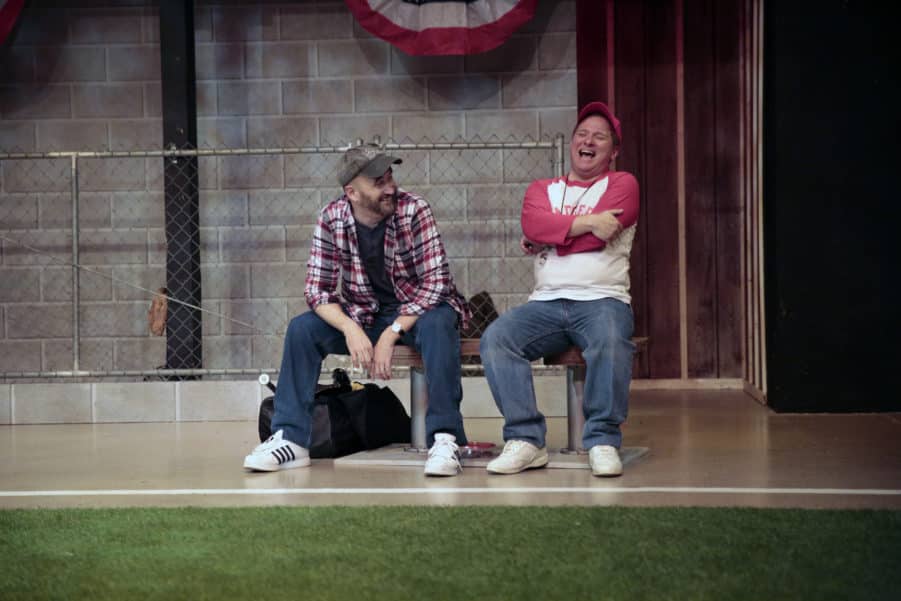
All photos by RyLo Media Design, Ryan C. Loyd
ROUNDING THIRD is a comedy with a heart. The two-man show about a couple of Little League coaches with very different ideas about how to coach their team is, first of all, absolutely hilarious. But secondly, you know these guys. They’re your friends, your neighbors, your family…maybe even you. These are the Dads doing their best for their kids and trying to navigate the line between having fun and “winning at all costs” — both in Little League and in life.
Playwright Richard Dresser talks about these opposing points of view, his own experience coaching Little League and why he wrote ROUNDING THIRD in his foreword to the play and we think you’ll get a kick out of reading it. But before you do, we thought you might also like to meet the noteworthy actors we are lucky enough to have performing on our stage for this show!
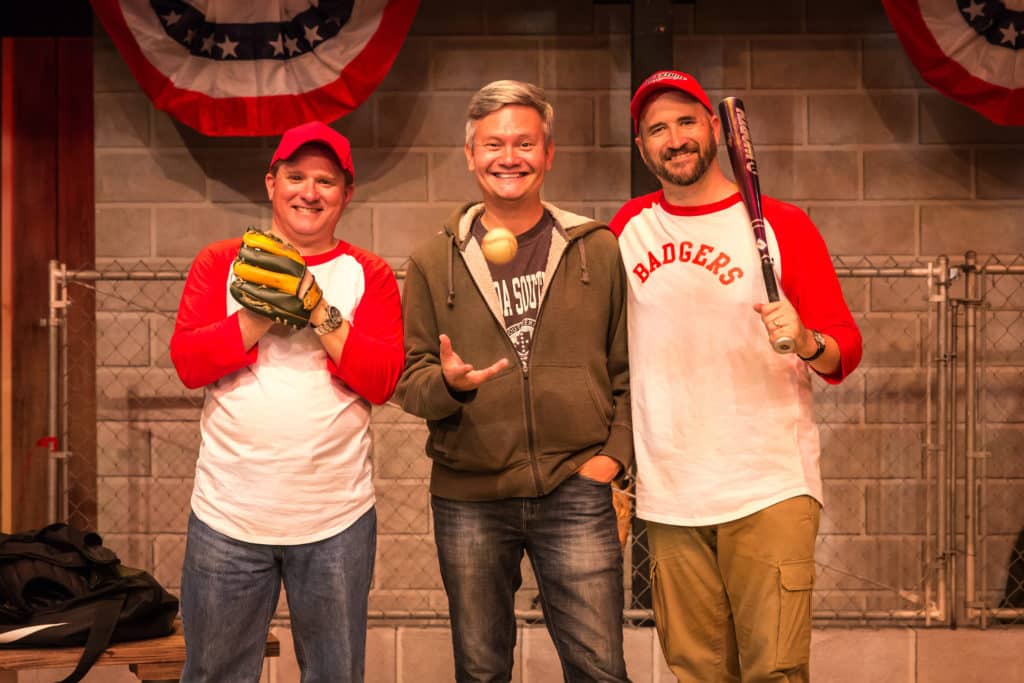
Timothy J. Cox, Lawrence Lesher and Travis Mitchell
Timothy J. Cox and Travis Mitchell are both New York-based actors with extensive experience acting in regional theatres throughout the country. When director Lawrence Lesher was brought on to direct this popular comedy, he knew just the guys to call to take on this wonderful two-man show. Friends and colleagues from way back, Tim, Travis and Lawrence actually rehearsed the play in New York’s Central Park for a few weeks before arriving in San Luis Obispo two weeks ago to put the finishing touches on the show. Now they’re all enjoying our beautiful Central Coast, and we’re absolutely thrilled to welcome them to SLO REP. Check out their websites HERE, HERE and HERE and you’ll see why we are so lucky to have all three of them here this month bringing us ROUNDING THIRD. And if you haven’t gotten your tickets yet, come on down to the theatre tonight, tomorrow or any time this weekend! Great seats are still available and you can buy yours right HERE.
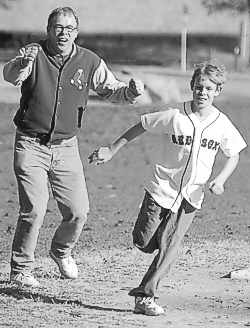
Photo of Rick and Sam Dresser by Mike Disciullo
And now, playwright Richard Dresser talks about baseball, kids and fatherhood:
One day my son, Sam, came home from Little League practice and announced that his coaches had provided the team with new strategy for the upcoming playoffs. When one of the slower kids on the team got on base, he’d receive a signal which meant that upon reaching the next base, he should slide and pretend to be injured. That way, the coaches could take him out of the game and replace him with a faster runner. When Sam said, “Coach, isn’t that cheating?” the coach replied, “No, Sam, that’s called strategy.”
I was horrified. Is this how our children are being trained to deal with competition? How many future Enrons are brewing on our Little League fields and in our school gyms under the watchful eyes of over-zealous coaches? What about building character and encouraging fair play? Or are such notions laughable in this country at this point in history? At that moment I knew that I had to write Rounding Third. But, as the play was germinating in my head, I found myself thrust more intimately into the fray, first as an assistant coach and then as the coach of my son’s team.
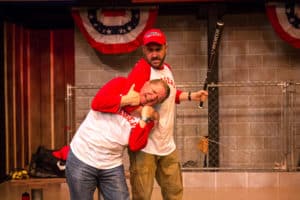 Philosophically, there was no question about where I stood. Little League should be fun and the kids should be encouraged to progress at their own speed, free of the overwhelming pressure that awaits them in practically every aspect of their lives, just around the corner.
Philosophically, there was no question about where I stood. Little League should be fun and the kids should be encouraged to progress at their own speed, free of the overwhelming pressure that awaits them in practically every aspect of their lives, just around the corner.
And yet, when I found myself actually coaching, I discovered that I wanted to win. I really wanted to win. That voice I heard bellowing across the diamond was, sadly, my own. Perhaps to rationalize the extent of these feelings, I concluded that since we live in such a highly competitive society, don’t we have an obligation to teach our children how to succeed? Given that this is the arena where they will be playing out their lives, shouldn’t we equip them with the tools it takes to win?
By the time I wrote the play, I believed passionately in these opposing points of view. We should protect and nurture our children during this brief, precious time in their lives. And we should teach them how to compete and how to win.
The two mismatched coaches in Rounding Third, the “win at all costs” Don and the “can’t we just have fun?” Michael, reflect this conflict. In my mind, they never agree and they are both right. And as they struggle to communicate their opposing philosophies to the team, they reveal who they are. The play ultimately became an exploration of what it is to be a man in this culture, how having children changes one’s self-perceptions, and what it truly means to succeed.
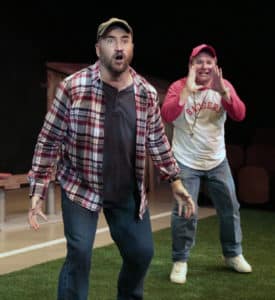 Now, when I hear Don’s exhortations to the team-which are delivered directly to the audience-I hear the voices of the many coaches I’ve had, starting with my first year of Little League. And I hear my own voice, more impatiently than I’d like, instructing, imploring, urging the team on to victory.
Now, when I hear Don’s exhortations to the team-which are delivered directly to the audience-I hear the voices of the many coaches I’ve had, starting with my first year of Little League. And I hear my own voice, more impatiently than I’d like, instructing, imploring, urging the team on to victory.
And when I hear Michael encouraging the team after a tough loss or fervently praying for his own hapless son to catch his first fly ball of the season, I hear the hopefulness and the innocence that seems both entirely appropriate and somewhat out of touch.
The horror I felt at hearing my son’s description of his coach’s “strategy” provided a powerful trigger to write a play. But writing the play was an act of discovery, reflecting my own conflicts about how we live with some kind of dignity and raise our children in a culture so ruthlessly obsessed with material success.
–Richard Dresser
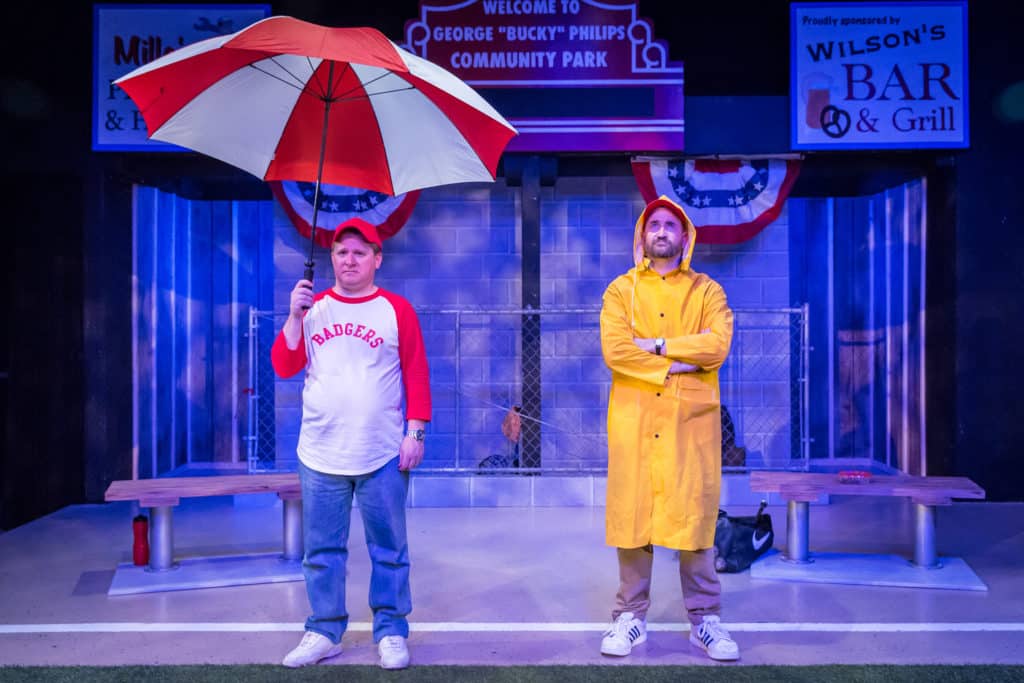
Don’t miss this delightful look at baseball, fatherhood and friendship. ROUNDING THIRD runs through November 19th and you can get your tickets right HERE, right NOW. Let’s PLAY BALL!


